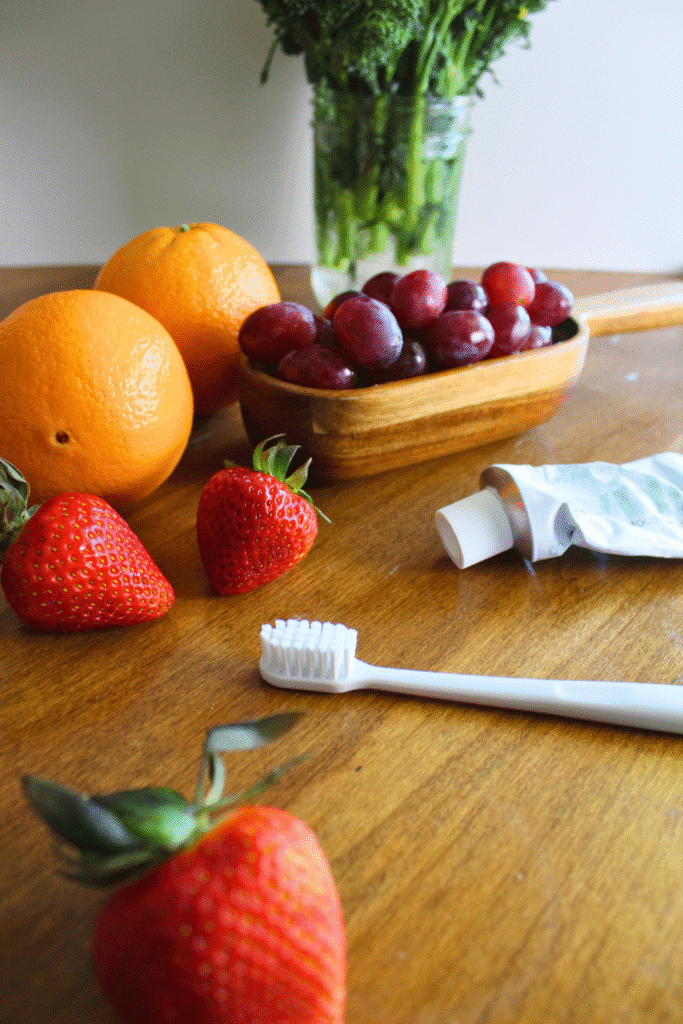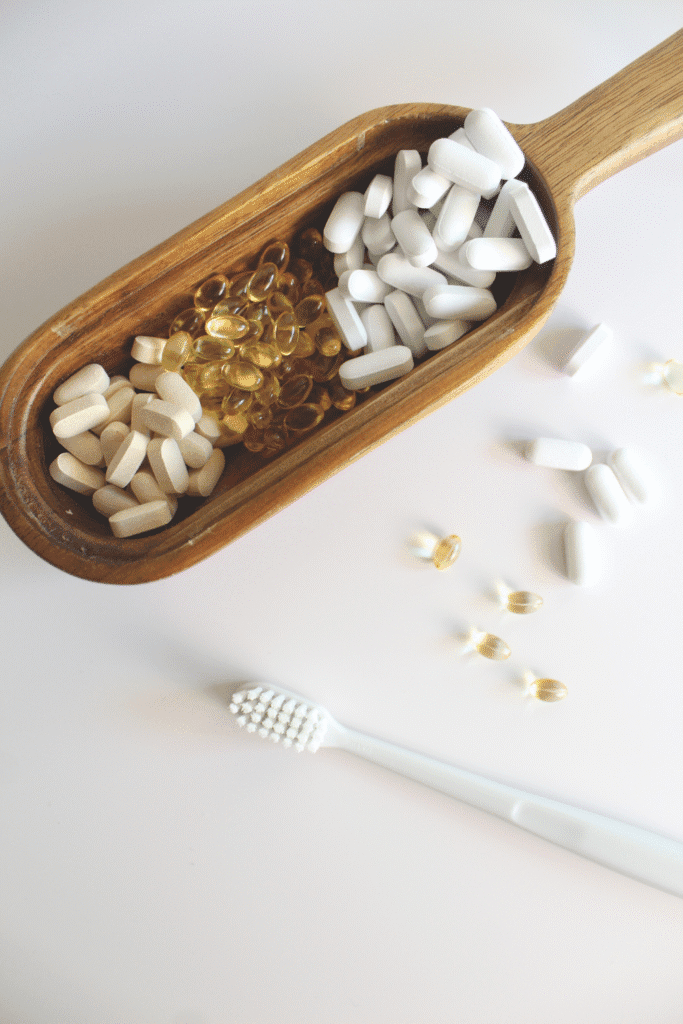EATING WELL FOR ORAL HEALTH
June 9, 2025
Oral nutrition is more than a trend—it’s the foundation of both dental and overall health. The foods you eat impact everything from your teeth and gums to your immune system, hormones, and even brain health. There’s a powerful, often overlooked connection between the mouth and the rest of the body, and it all starts with what’s on your plate.
This guide explores the mouth-to-body connection through food, breaking down how nutrients influence oral health and how oral health can signal deeper imbalances in the body. Whether you’re dealing with gum recession, cavities, dry mouth, or just want to strengthen your teeth naturally, this article will show you what to eat, what to avoid, and how to use nutrition to support a healthy smile from the inside out.

Explore some of my favorite recommended products to support your health journey (displayed on this page as affiliate links), and remember to always consult a healthcare professional before making any changes to your diet or lifestyle—full medical disclaimer here.
The Mouth-Body Connection
We’ve been taught to treat the body as a collection of separate parts—your teeth, your heart, your hormones—but that approach misses the bigger picture.
In reality, your body is one connected system, and your mouth is often the first place deeper issues show up. Bleeding gums, chronic bad breath, or a cavity aren’t just local problems—they can be early signs of nutrient deficiencies, inflammation, or metabolic imbalances.
Your mouth is also home to its own microbiome—an ecosystem of beneficial bacteria that help regulate pH, break down food, protect against pathogens, and maintain strong, healthy gums and teeth. But when your diet is high in sugar, seed oils, and ultra-processed carbs, and low in essential nutrients, that balance is disrupted.
The result? Inflammation, plaque, gum recession, and more. And that oral inflammation doesn’t stay put—it can enter your bloodstream and fuel larger issues like heart disease, diabetes, Alzheimer’s, and even hormone dysfunction. Supporting your oral health with real, nutrient-dense food isn’t just good for your teeth—it’s a foundational step toward full-body wellness.
What to Eat for a Healthier Mouth
Let’s talk about the foods that support strong teeth, healthy gums, and a thriving oral microbiome:
1. Vitamin K2-Rich Foods
Vitamin K2 helps shuttle calcium to the right places—your bones and teeth—and prevents it from building up in soft tissues like arteries or gums. It’s crucial for remineralizing enamel and keeping teeth strong from the inside out.
Best sources: Grass-fed butter, ghee, pastured egg yolks, liver, and aged cheeses (like gouda and brie).
(“Pastured” means the animal was raised primarily on open pasture, where it could roam freely and graze naturally—instead of being confined to feedlots or indoor facilities).
2. Vitamin D3
D3 supports immune health and calcium absorption, both of which are essential for gum and tooth strength. Deficiency is linked to cavities, gum inflammation, and bone loss in the jaw.
Best sources: Wild-caught salmon, sardines, pastured eggs, cod liver oil, and sensible sun exposure.
3. Vitamin A
Vitamin A helps maintain the mucous membranes inside the mouth and supports tissue healing. It also boosts saliva production, which is vital for neutralizing acids and washing away bacteria.
Best sources: Liver, sweet potatoes, carrots, leafy greens, and raw dairy.
4. Collagen & Vitamin C
Gum recession and bleeding are often early signs of vitamin C deficiency. Collagen supports gum structure, while vitamin C is needed to build and maintain it. They work hand-in-hand.
Best sources: Bone broth, citrus fruits, strawberries, bell peppers, and grass-fed gelatin or collagen powder.
5. Calcium & Magnesium
Calcium builds strong enamel, but it needs magnesium to be properly absorbed and utilized. Both are essential in fighting cavities and enamel erosion.
Best sources: Raw dairy, leafy greens, sesame seeds, sardines (with bones), almonds, and cacao.
6. Zinc
Zinc helps balance the oral microbiome and supports tissue healing, making it a valuable nutrient for gum health and immunity.
Best sources: Grass-fed beef, oysters, pumpkin seeds, and lentils.
7. Healthy Fats
Fats from quality animal sources and plants help reduce inflammation and support the absorption of fat-soluble vitamins (A, D, E, and K).
Best sources: Pastured butter, coconut oil, avocado, tallow, and olive oil.
8. Phosphorus
Phosphorus works closely with calcium to form strong teeth and bones and helps rebuild enamel after demineralization.
Best sources: Pastured meats, eggs, lentils, sunflower seeds, and fish.
Did You Know… Aging Starts with Collagen Loss?
Your body naturally starts producing less collagen around age 25, and that decline affects everything from your skin to your gums. This makes it harder to repair tissue, maintain firm gums, and support strong teeth. Eating collagen-rich foods and getting enough vitamin C can help support your body’s ability to rebuild what it’s losing.
Foods + Habits to Avoid
What you skip matters just as much as what you eat.
Refined sugar: Feeds harmful bacteria and triggers enamel-damaging acid.
Phytic acid: Found in unsoaked grains, nuts, and legumes. It blocks mineral absorption unless properly prepared.
Seed oils: Like canola, soybean, and corn oil—promote inflammation throughout the body, including in your gums.
Sticky carbs: Crackers, granola bars, and dried fruit cling to your teeth and feed decay-causing bacteria.
Constant snacking: Keeps your mouth in an acidic state and stops saliva from doing its job.
Choosing Better Sugars for Your Teeth
Refined cane sugar fuels harmful bacteria in your mouth, leading to acid production that weakens enamel, causes cavities, and irritates gums. Artificial sweeteners like aspartame, sucralose, and saccharin may be calorie-free, but they can disrupt your oral microbiome and offer no real nutritional benefit. Better options include xylitol (which actively helps prevent decay), raw honey, monk fruit, and coconut sugar—natural sweeteners that are gentler on your teeth and less likely to feed bad bacteria.

If You’re Already Dealing with Oral Issues…
Don’t worry—your mouth can heal. Here’s what to focus on:
Gum Recession
Boost vitamin C, collagen, and K2
Add magnesium and omega-3s
Try oil pulling with coconut oil to reduce inflammation and bacteria
Cavities
Prioritize calcium, phosphorus, and vitamin D3
Eliminate refined sugar and acidic drinks
Include bone broth, fermented veggies, and raw dairy for mineral support
Dry Mouth
Drink more water and add healthy fats to your meals
Sip herbal teas like chamomile or licorice root
Ensure you’re getting enough vitamin A and zinc
Bleeding Gums
Add vitamin C, collagen, and CoQ10
Avoid inflammatory oils and sugar
Gently tongue scrape and brush at a 45-degree angle to avoid further irritation
Supportive Supplements (If Needed)
While real food should be your foundation, high-quality supplements can help fill the gaps:
Cod liver oil – for A, D, and omega-3s
Beef liver capsules – nature’s multivitamin
K2 + D3 combo – for mineral utilization
Magnesium glycinate – gentle and well-absorbed
Collagen peptides or gelatin – gum and tissue support
Zinc lozenges – especially helpful for dry mouth or immune health
Always choose clean-label supplements with minimal fillers—and talk to a practitioner if you’re dealing with more serious issues.
Food First, Supplements Second: Why Real Nutrition Matters Most
Whole foods deliver vitamins and minerals in their most natural, bioavailable form—paired with fiber, enzymes, and co-nutrients your body needs to absorb them fully. While supplements can be a great support (especially during deficiency or stress), they’re not a replacement for a nutrient-rich diet. Think of supplements as backup—not the foundation.
Nourish Your Mouth Like the Rest of Your Body
Your mouth isn’t separate from your health—it reflects it.
Healthy gums, strong enamel, and even your breath are signs of what’s happening inside. When you nourish your body with mineral-rich, whole foods and cut out what causes harm, your mouth responds quickly—and so does your energy, mood, and immune system.
You don’t need to change everything overnight. Start with one thing: add in bone broth, swap your oils, or just stop snacking all day. Small steps add up.
Your smile is worth the effort—and so is your health.
